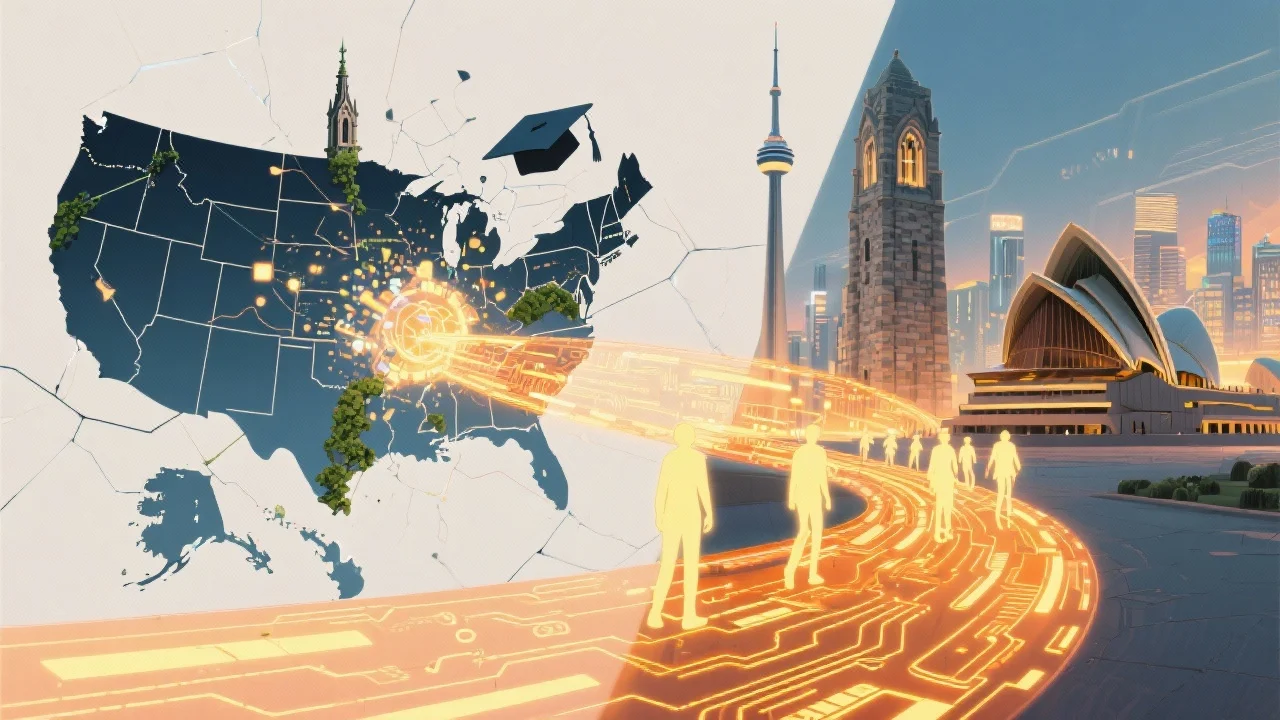
A Sudden Reversal of the Flow
For most of the 20th century, the story of global scholarship ran in a single direction: toward America.
Researchers fleeing repression in Europe, Asia, and Latin America saw U.S. universities as sanctuaries of autonomy and excellence. But in 2025, that changed. A U.S. brain drain is underway, triggered by deep federal funding cuts, political attacks on universities, and a climate hostile to expertise. Two democratic allies — Canada and Australia — are poised to benefit from this turning point.
A Nature survey found that three out of four U.S.-based researchers were considering leaving the country. Meanwhile, applications by American scientists for Canadian university posts rose 41 percent in just the first three months of 2025. The shift is already visible in the hiring practices of leading foreign institutions.
Toronto as a Sanctuary for Scholars
Canadian universities are emerging as the most visible winners of this moment. The University of Toronto has recruited prominent American professors such as Yale historians Timothy Snyder and Marci Shore, alongside philosopher Jason Stanley. For them, the calculus was stark: a choice between battling censorship in the United States or moving north to preserve academic freedom.
Snyder called Canada “the Ukraine of North America,” warning that current politics risk undermining American democracy and higher education. Their relocation reflects a broader dynamic: Canada recruiting U.S. academics with not only funding but also the promise of a more stable social contract around knowledge and free inquiry.
Other Canadian institutions are joining the push. Quebec’s government is running targeted campaigns aimed at climate scientists and biomedical researchers facing canceled grants in the United States. Academic freedom in Canada and Australia is being framed almost as a competitive advantage, a draw for those weary of the ideological battles consuming U.S. campuses.
Australia’s Quiet Recruitment Drive
While Canada gets much of the spotlight, Australia academic migration may be just as consequential. The Australian government is weighing fast-track visas and enhanced grant packages to attract American researchers. Universities in Sydney and Melbourne already market themselves as safe havens for climate scientists, reproductive health experts, and social theorists whose work has come under attack in the U.S.
For those burned by funding freezes at agencies like the NIH or EPA, the appeal of Australia is not simply a job but insulation from U.S. political whiplash. As one Sydney vice-chancellor put it, “We don’t want your wars over terminology. We want your science.”
The Costs to U.S. Innovation
The exodus is being felt at home. The Trump administration’s recent termination of $20 billion in clean-energy research grants crippled entire labs, and a freeze at the National Institutes of Health disrupted cancer and dementia studies. Faculty who once advised students to apply to Harvard or Stanford are now cautioning against it, worried that Trump cuts to science funding could derail careers.
This erosion carries economic risks. Analysts estimate that reduced public R&D could shave almost 7 percent off U.S. GDP in the next decade — the equivalent of erasing the growth America gained after the Great Recession. More existentially, the U.S. may lose its claim to set the global research agenda, from AI ethics frameworks to climate policy.
Strategic Gains Abroad
For Ottawa, the Canada recruiting U.S. researchers narrative fits neatly into a larger ambition to position the country as a global innovation leader. Investment programs like the Canada Excellence Research Chairs funnel multi‑million‑dollar grants into universities specifically to attract displaced American professors. Meanwhile, Australia academic migration complements the country’s economic diversification agenda, with talent pathways tied to energy transition and biotech innovation.
Both countries understand the stakes: capturing disillusioned American researchers provides not just prestige but also the seeds for new industries. Their long-term economic rationale echoes America’s own mid‑20th‑century rise, when refugees from fascist Europe seeded Silicon Valley and U.S. nuclear physics.
A Shrinking of the American Intellectual Commons
The paradox is clear: a superpower once sustained by inflows of talent is now facing a reverse current. The U.S. brain drain 2025 will not empty labs overnight, but it is breaking the assumption that American universities hold a permanent monopoly on prestige. Scholars are choosing stability over standing, academic freedom in Canada and Australia over disillusion in Washington.
Every researcher who boxes up a library in Boston and unpacks it in Toronto or Sydney is making the same quiet calculation: science belongs where it can thrive. And for now, that place looks less like California and more like Ontario or New South Wales.
